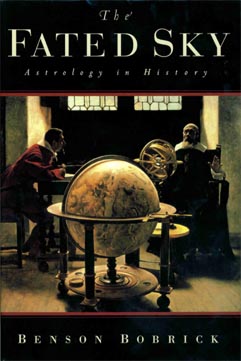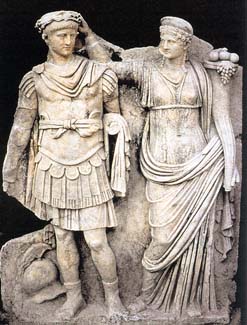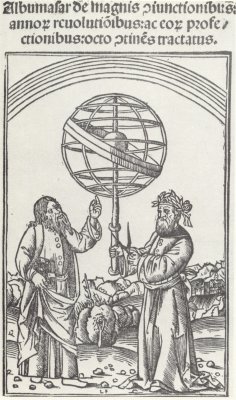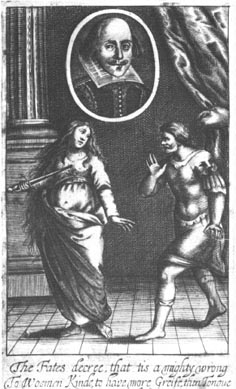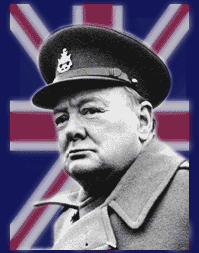On the
subject of
astrology, the world is pretty much
divided into three camps: skeptics or religious zealots who know
nothing at all
about it
(but think they do) and loudly preach against it, consumers who only
know
their “sun
signs” and use it for fun, and practitioners who know
entirely
too little about
it and call themselves professionals. The result has been, for the last
couple
of hundred years, that this former “Mother of
Sciences” has
fallen onto hard
times, indeed.
But
there’s
something to it that just won’t quit –
something in the inner workings of human evolution that knows that God
doesn’t
play dice, a gut-level instinct that everything is somehow connected,
including
what’s on the earth and what’s in the sky, and that
survival depends upon
knowing it. The pursuit of just what those connections are and how to
frame
them is what’s bringing astrology back into vogue
worldwide and may
eventually restore her maternal status. To the horror of some and the
delight
of others, fervent interest in the stars, destiny, free will, chance,
and the
individual’s place among them is on the rise, big-time, but
so
far with more
heat than light on the subject. Everybody’s got a close-up
viewpoint to promote,
but few have a broad perspective on the matter.
Fortunately,
historian
Benson Bobrick has come along in
the nick of time (or, at the right, destined time, shall we say?) to
help
correct the problem. It’s time to see the forest instead of
the trees and
to study history so we don’t make the same mistakes yet
again.
And, as so often
happens, it is a work of newly-researched and refreshingly revisionist
history,
instead
of retrospective propaganda written by victors, that clarifies the
issue
and brilliantly illumines a formerly ill-lit stage.
In The
Fated Sky,
Brobrick rises above the current
frays and their frayed arguments to present us with pure history, which
tells
the story better than any proponent of any particular approach possibly
could.
More important, he tells it from an inside, historical perspective
without the modernist “we-now-know-better” attitude
that
often plagues cultural
and scientific histories. He traces the evolution of astrology from the
inside
out, from its beginnings in Mesopotamia, through its golden Classical,
Arabic,
and Renaissance ages, into its sudden forcible rejection by both
science and
religion, right up to its currently hopeful but often clueless revival.
His
ever-detailed view is that of the astrologers themselves along with the
daily
users of their art – how and why they formulated what they
did,
and their
successes and failures in applying it to themselves and each other.
It’s
a long
journey, from there to here, and it’s a
well-told, entertaining, and eye-opening read all along the way.
Astrology buffs may already know that major public figures from the
Roman emperors
through the Medici to Ronald Reagan often consulted
the
stars. What
even
aficionados may not have heard are the amazing and marvelous details of
the
scheming and counter-scheming that went down on a daily basis between
astrologers and the royalty, politicians, generals, businessmen,
bishops and
popes who consulted them. On the scientific side, it is known to many
that some
of the most influential founders of modern science – Galileo,
Newton, Kepler,
Copernicus, Brahe, Boyle – knew something of astrology. But
few
realize how
totally wrapped up in it they often were, and how much it led their way
to the
discoveries they are most known for.
Further,
most people
today are only dimly aware of how steeped in astrological reference and
thinking European culture itself was, and still is. Most of us know of
a couple
of Shakespeare references to astrology, but in fact he made hundreds of
them --
often long, playful banters that assumed his audience to have an
intimate
knowledge of natal horoscopes and the particulars of their
interpretation. And
he was nothing out of the ordinary in this respect. Even the Church was
part of
the game, with elaborate arguments by St. Augustine and Aquinas that allowed
this Classical view of the universe
to fit in with the tenets of Christianity, or at least framed friendly
parts
for both to play. Not without reason was William Lilly's Christian
Astrology
the most important book of the 17th century on the subject.
The
fact is, astrology
was at the heart of the Western world-view - physically and spiritually
- right
up until well into the 18th century. It was the crowning technical and
philosophical endeavor that attempted to describe and make sense of the
universe,
inside and outside, from the cradle to the grave and beyond. All the
sciences
were within its purview, and vice versa, because life was considered to
be all
of a piece. It attracted the best and brightest minds in science,
mathematics,
literature, politics, and religion and in the process reached new
heights of
technical complexity, which only the best and brightest could generate
or even
keep track of. A glance at some of the generous quotes included from
contemporary chart
analysis would challenge the most astute modern astrologer, and they
are
impressively beyond arcane to the passing reader.
Sadly,
astrology's
brilliance was to become its undoing. As modern science evolved in the
17th and
18th centuries - founded in large part by thinkers who were astrologers
themselves - a new, separative concept of the world emerged, fueled by
the
economic gains provided by new technology. With it came a schism of
unbridgeable proportions between the spiritual and secular. The
foundations
laid by the likes of Newton sprouted a burgeoning world of mathematics
and
applied science that bankrolled a triumphant evolving secular society
and
backed the Church into a corner. By the middle of the 18th century,
secular and
spiritual sides pretty much agreed to part ways, with the generally
ineffable
and profound parts of life relegated to religion and the immediately
tangible
yet complex world awarded to science. Astrology, and the whole idea
that all
facets of existence are of necessity connected, was suddenly left
holding
the bag in
the middle and was soon excoriated by both sides. By the 19th century,
it was
considered quackery by one side, blasphemy by the other, and often
outlawed by
both. What had once been the most highly trained art of intellectuals
became a
lost litter of lore, scattered in the gutters of the uneducated and
gullible
masses who feasted on almanac prattlings, patent medicine, and
sun-sign
astrology.
In the
latter 20th
century,
astrology regained some small
semblance of its former stature, but only by adopting, and being
adopted by,
soft science like psychology and fringe religion like Theosophy. From
pop
sun-signs to “Jungian” astrology to “past
life”
sign and house regression, we are still a long way down from our former
heights and not doing much to reclimb
them. We are
trying rather badly to shoehorn pieces of a universal world-view into
our own
pet projections and cosmic conceits. Bobrick notes just that, and he
has little
patience for most modern practitioners. Yet, he is not without
hope,
observing that disciplines as far apart as weather forecasting and
agro-investment are including possible effects of the motions of Sun,
moon, and
planets, albeit tentatively.
Despite
its scope, the
book is individually
insightful and entertaining – it’s about how humans
have
used the art, after
all, in their own crazy ways. Suppose you’re emperor of Rome
and
it’s been predicted
that you face catastrophe ahead. Isn’t a logical approach to
instigate
disaster yourself, to pre-fulfill the prophecy and divert Fate's
intentions?
That’s what Nero thought, and so Rome burned. Ultimately, it
didn’t fix it for
him, but it did distract the public for a while. Toward this end of
history,
there’s Hitler. He actually held astrologers in contempt,
though
he had them
rounded up and shot, just in case. Rumors led the British to believe
otherwise,
however, so they secretly hired their own astrologer to
try to
predict the moves the Fuhrer would make based on what his (actually
non-existent) astrologers
were advising –
and with surprising success. The book abounds with such wonderful
contradictions – and also with tales of astonishingly
accurate
predictions
based solely
on cold charts -- where the astrologer doesn’t know
for
whom he’s
forecasting -- one of the phenomena that makes astrology uniquely
reliable
(sometimes) and bafflingly mysterious (always). Strange to say, ancient
astrologers were
much better at that than most are today, probably because their
methods
were more rigorous and their world itself had more limited options.
The
Fated Sky
doesn’t
officially take sides
on the validity of astrology, which is probably a wise move on the
author’s part, considering
that the subject faces, as he says, “head winds”
from all
points of the
compass. Early reviews of the book prove him right, as mainstream
critics somewhat
nervously
editorialize on the issue, implying either that it should not be taken
seriously (The
Washington Post) or that
it’s no crazier than neo-Darwinism
or string
theory (The New York Times).
The former senses that Bobrick may
be
dangerously
pro-astrology, and the latter cheers him on for it, each with doubtful
premises -- but all have applauded his thorough and
enlightening
inside approach to its history.
We
applaud it,
too, without reservation. If you
want to get a thorough sweep on Western
astrology and enjoy a
really good read in the process, go out and buy this book immediately.
There’s never been
anything
remotely close to it. And, for anyone intending to study the subject
with
professional aspirations, this should be required
reading
– after which,
at least half of the titles in the generous thirteen-page bibliography
should
come next.
 Benson Bobrick
has been
called, in The New York Times
Book Review, “perhaps
one of the most interesting historians
writing in
America today.” He is the celebrated author of eight previous
books on various
subjects, ranging from the American Revolution to the translation of
the Bible
into English, and holds a doctorate in English and Comparative
Literature from
Columbia University. In 2002 he received the Literature Award of the
American
Academy of Arts and Letters.
Benson Bobrick
has been
called, in The New York Times
Book Review, “perhaps
one of the most interesting historians
writing in
America today.” He is the celebrated author of eight previous
books on various
subjects, ranging from the American Revolution to the translation of
the Bible
into English, and holds a doctorate in English and Comparative
Literature from
Columbia University. In 2002 he received the Literature Award of the
American
Academy of Arts and Letters.

